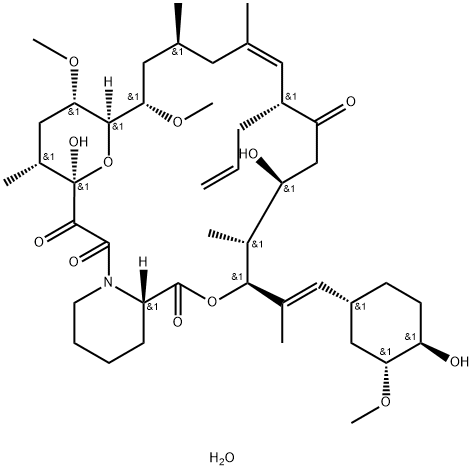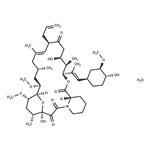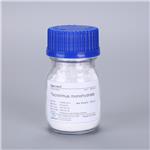Uses
immune suppressant, antifungal
Uses
FK-506 monohydrate (Tacrolimus Monohydrate) has been used:
-
as an immunosuppressive agent in coculture medium to study the effect of immunologic reaction
-
as a calcineurin inhibitor, in anhydrous Me2SO solution
-
to treat retinal pigment epithelial cells to measure possible cytotoxicity
Definition
ChEBI: A hydrate that is the monohydrate form of tacrolimus.
Biological Activity
Potent calcineurin (protein phosphatase 2B) inhibitor that requires FK 506-binding protein 12 (FKBP12) for activity (IC 50 = 3 nM). Inhibits secretion of IL-1, IL-2 (IC 50 = 1 nM), IL-3, IL-4, IL-6 (IC 50 = 35 nM), GM-CSF, TNF α (IC 50 = 10 nM), IFN γ and Myc from activated T-cells in vitro . Exhibits potent immunosuppressive, neuroprotective and anticonvulsant activity in vivo .
Biochem/physiol Actions
FK-506 also appears to inhibit Na+/Ca2+ exchange. FK-506 and its derivatives demonstrate significant neurodegenerative activity. This property seems to arise via different mechanisms. FK-506 is also useful in treating ophthalmologic complications such as corneal graft rejection, uveoretinitis and allergen induced conjunctivitis.
Safety Profile
A poison by ingestion and intravenous routes. When heated to decomposition it emits toxic vapors of NOx.
in vitro
Tacrolimus monohydrate (FK506 monohydrate; Fujimycin monohydrate; FR900506 monohydrate) inhibits calcium-dependent events, such as IL-2 gene transcription, NO synthase activation, cell degranulation, and apoptosis. Tacrolimus also potentiates the actions of glucocorticoids and progesterone by binding to FKBPs contained within the hormone receptor complex, preventing degradation. The agent may enhance the expression of the TGFβ-1 gene in a fashion analogous to that demonstrated for CsA. T cell proliferation in response to ligation of the T cell receptor is inhibited by Tacrolimus. Treatment with a low concentration of Tacrolimus (FK506,10 μg/L) does not significantly affect the proliferation of MH3924A cells (P=0.135). Upon treatment with higher concentrations of Tacrolimus (100-1,000 μg/L), the proliferation of MH3924A cells is significantly enhanced (P<0.01). Treatment with AMD3100 at any concentration (10, 50 or 100 μg/L) has no obvious effect on MH3924A cell proliferation (P>0.05). However, when different concentrations of AMD3100 are combined with 100 μg/L Tacrolimus, the in vitro proliferation of MH3924A cells is increased (P<0.01).




